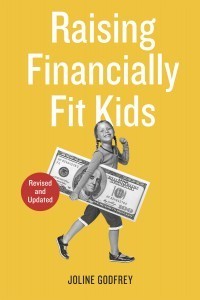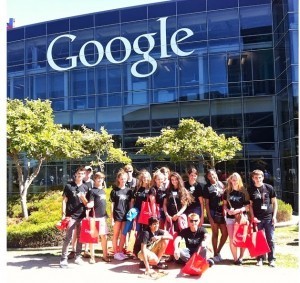Joline Godfrey's Blog
July 11, 2014
Parents, Kids and Cash…

 Every now and then Heidi Stevens, a reporter with the Chicago Tribune asks me to comment on something related to Kids and Money. Last week she wanted to talk about a survey that indicates how much cash parents hand out to their kids. Our conversation can be read here…
Every now and then Heidi Stevens, a reporter with the Chicago Tribune asks me to comment on something related to Kids and Money. Last week she wanted to talk about a survey that indicates how much cash parents hand out to their kids. Our conversation can be read here…http://www.chicagotribune.com/features/ct-0707-parents-cash-balancing-20140707,0,1340613.column
Recommended Summer Reading from Joline
The Martian, by Andy Weir. Good Reads describes this book as ‘Apollo 13 meets Cast Away.’ It is that for sure—and so much more. This book was recommended to me by a 15 year old, but it is not a YA book—it is a gripping tale, set in the not so distant future, of a man, accidentally left behind on a Mars mission, and his attempt to stay alive. It is one of the most ingenious instructional works on resilience and ingenuity I’ve ever read and it should be in every family’s tool kit. Rumor has it that it will also be a movie; directed by Ridley Scott and starring Matt Damon. But don’t wait for the movie; treat yourself to this summer novel for the whole family (read it outloud over a campfire—it will keep everyone on the edge of their log!)
Speaking of resilience, that’s another book I often suggest: Resilience, by Andrew Zolli. Though written for a corporate audience, I recognized it as another handbook for families as soon as I heard Andrew speak about it. The question he addresses is: what do organizations need to thrive in an era of steady disruption: of technology, economics, and geography? His ideas are as relevant for a family as for a company and his stories explaining how and why are entertaining and compelling. Another good beach read—honest!
OK, maybe not a beach read, but surely another important summer fun book is Collective Genius, written by my friends Linda Hill, Greg Brandeau, Emily Truelove and Kent Lineback. It is partly the story of how Pixar (where Greg was the long time CTO) manages to stay fresh and creative, animated film after animated film, partly the story of how we can do it too. Like Resilence, it was written with the assumption that smart company executives will read the book and take away lessons to be applied to their own companies. But of course I am seeing that my smart, thought leader families are stealing these good ideas and applying them to the quest to help families thrive. If you and your family liked Cars, Toy Story II, and Up, read this book and understand why.
A Wealth of Possibilities: Navigating Family, Money and Legacy, by Ellen Perry, is another cool book for a hot summer. A small book (you can read this in an afternoon), with big ideas about money and family. For every family who worries that “money will ruin their kids”, or that money is a dysfunctional element of their family life, this report from the field offers fresh ideas and reassurance for how families can build meaning in their lives.
I also LOVE the Secrets of Happy Families by Bruce Feiler. I was late to this book. Fortunately NYT columnist Ron Leiber (whose Your Money column should be on your must read list as well) sent me a copy and I am flummoxed that I didn’t read it sooner. It is a fun and amazingly practical book with ideas every family can apply immediately. Example: on pages 179/80, he addresses in just a few paragraphs ways to manage privacy, use color, and manage light that will make family life better almost immediately. Yes, this is another beach book.
 It’s shameless I know, but I have to give a plug for my own new/old book, Raising Financially Fit Kids. If you’re reading this blog, chances are you’ve had some exposure to my book. Quick, take a look at the cover. If it’s orange you need the new one with a yellow cover! The new Revised,
Raising FInancially Kids, Second Edition
, was released last June (a year ago). The first one (as proud of it as I was) was written pre-social media; pre-IPhone; pre-2008 financial meltdown. The new edition is written in the context of a much different world—and it is written by someone (me) with another decade of experience (and I hope, wisdom). I hope you will find it addresses the themes I mention in the books above: resilience, resourcefulness, creativity, resourcefulness, and happiness.
It’s shameless I know, but I have to give a plug for my own new/old book, Raising Financially Fit Kids. If you’re reading this blog, chances are you’ve had some exposure to my book. Quick, take a look at the cover. If it’s orange you need the new one with a yellow cover! The new Revised,
Raising FInancially Kids, Second Edition
, was released last June (a year ago). The first one (as proud of it as I was) was written pre-social media; pre-IPhone; pre-2008 financial meltdown. The new edition is written in the context of a much different world—and it is written by someone (me) with another decade of experience (and I hope, wisdom). I hope you will find it addresses the themes I mention in the books above: resilience, resourcefulness, creativity, resourcefulness, and happiness.Financial education is not, of course, just about the money. It’s about raising great families. I hope these books will help you do that.Have a great summer!
May 19, 2014
Secrets to Talking with Kids about Wealth
by Joline Godfrey, CEO Independent Means.
Last week I was in Houston, delivering a talk for the Greater Houston Community Foundation. The group included grandparents, adult children, twenty somethings—and 7 pregnant moms! The questions from such a diverse audience tend to cover a lot of ground and had it not been for the dinner I could tell they were eager to get to, I might have spent several more hours covering the very broad topic of ‘how to talk with children (using the term very broadly) about money’. But these dinners are meant to be appetizers for a bigger conversation so I stopped short for risk of losing my audience to hunger!
But later, over dessert, I was asked to expand on some of my comments. I know the hope is ever present that there is some secret to talking effectively with one’s children (whether 5 or 25). And I suppose there is—it’s just not a quick—or easy—or single secret. But wanting to be helpful, I promised I would reprise the key themes in my talk in my next blog, so here it is to share with you all. For the purpose of this column, I focus mainly on almost adult children, though the tenets are applicable at every age.
Seven Steps to Talking with Your Children about Wealth
Acquiring financial mastery, even at the most fundamental level that any beneficiary needs, takes three things: an understanding of context (who are we and what are our values in regard to the wealth); skill building (specific, concrete skills and language for stewarding wealth); and practice, (an intention to get better over time).
They may not need the 10,000 hours that Malcolm Gladwell famously tells us we need for mastery, but they need more than an afternoon, a single conversation.
The ‘steps’ below are offered in the hope that this will get a rich, challenging—and of course more rewarding—journey started.
1) Don’t, talk about wealth. Talk about values, purpose, family vision and goals. Often. Even when they roll their eyes or seem to ignore you. Keep talking. Start with your values, not the money.
2) Talk some more about values, purpose, family vision and goals. Families get derailed when they talk about wealth because they begin with the money, not the purpose of that money; the values driving the money, the story and history behind the money.
3). Introduce transparency on a micro-level. If you think you’re aligned with your children (at any stage or age) on values and purpose (this usually takes a year or two), introduce transparency in a grounded, practical way: what is the cost of their current lifestyle? Not, how much will they inherit or what is the net worth of the family. Start on a practical scale: what does it cost to live the life they are currently leading; how do they want that to change and what are they doing to attain their goals?
Families who are providing invisible allowances (covering credit card bills, subsidizing rent, taking care of insurance, health costs, travel, etc.) are not giving the next generation the real data they need to manage more complex information later on. Reveal the cost of the things you and they assume are covered by parenting responsibilities. This is not a punishment or a judgment; it’s just an acknowledgement of what is real.
4). Provide opportunities to exercise judgment, independence, resourcefulness. Make that invisible allowance visible and start a beta project to let them manage their independence. (This is much more appealing than asking them to manage a budget.). Give them data: this is what you spend to maintain the car; live in that apartment; eat out; shop at XZY Boutique, ski in the Alps, etc.). Now hand over the cash that you have been providing behind the scenes and let them manage it. This is called practice and it’s the opportunity you provide before giving them access to funds on a larger scale. If your 24 year old can’t manage $25-$50K, or $75K; they’ll be challenged to manage $100K, $1million, and more.
5) Up the Ante. Give them REAL Responsibility. Are they handling their personal finances fairly well? Invite them to co-invest with you in a fund, a project, anything that is understandable enough that it can be used to teach due diligence, cost/benefit assessments, balance sheets, growth (long and short term), stakeholder management (who are the stakeholders in this investment and what are their interests? What happens when interests are conflicting?). You may have started your kids on training wheels when they first learned to ride a bike. Co-investing is the financial equivalent of training wheels. Talking about ‘wealth’ before they have a true understanding of how money works is a little unkind, like sending a 4-year old on a bike without the training wheels.
6) Support the Development of Character. If you don’t have a family foundation they can easily participate in, invite them to set up a donor advised fund. Don’t do it for them, coach them, advise them, help them through the steps. Then coach them through the process of thinking about what matters to them. (back to that values conversation; see Steps 1 and 2). And don’t just give them money to give away. Teaching kids to give away money without developing the concomitant skills of developing strategy, purpose, and a connection to one’s values is just teaching kids to give money away—it does little to develop thoughtful philanthropists. And of course philanthropy is not just about the money (see Step 2 again). It’s about an intention to use one’s talent, time, AND money in meaningful ways. How do they spend their time, as well as money and talent, making a difference for others?
7) Connect them to the world. The point of practice is to prepare them for the responsibilities of wealth. This includes participating knowledgeably in significant meetings; meeting potential mentors and colleagues (the better prepared they are the more seriously they will be taken). Read the news with them, include them in important conversations. When traveling, do more than vacation, use your trips to expand their worldview and give them context for the world they are investing in. They cannot vote or invest responsibly without understanding the world around them.
8) Now refresh your family vision with their input. If they have achieved the kind of financial fluency you hoped, now is the time to let their voice help shape a next generation vision. Review the family governance policies to make sure there is room for next generation voices.
The odd thing about these steps is that if you commit to the process, you never really have a ‘conversation about ‘wealth.’ Rather you have a conversation about life, what’s important, purpose, dreams, hopes, the stuff of family, the stuff that has real meaning.
May 12, 2014
Terrence McNally and Financial Education
What Terrence McNally’s Mothers and Sons h as to do with Financial Education
Terrence McNally’s new play, Mothers and Sons, is not just about mothers and sons. And the play is not about money either, though money is subtext, occasionally showing itself as an element of the tension in this oh so 21st century ‘family.’
It is Terrence McNally’s great talent to reveal that whatever pain befalls us as individuals–no matter the specifics of that pain, all that matters is the conversation, the connections, the ability to BE with one another in the face of life’s most hideous passages. Better than most playwrights today, McNally illuminates our fundamental need for one another–in family, in community, in intimacy–and makes it OK. Needing, in McNally’s world, is strength, not weakness. Connection is courage and truth, not neediness.
Mothers and Sons tells the story of a son lost; a lover moved on; and the reconfiguring of one family into another. Tyne Daly plays the imperious Yankee widow from Dallas, Mrs. Girard, fully embodying a mother bereft and bewildered by the twists and turns of life that have left her so alone. But as the play unfolds and Mrs. Girard allows herself to really SEE the extent to which her fears and hypocrisies helped engineer the loss of her son, way before the AIDS virus took him, the amazing Daly helps us see ourselves in the harsh, bright light of self awareness–those awful, necessary moments when we become more real, more authentic; undefended by our untruths and denials. Perversely, these are often our finest moments, certainly our most human experiences.
There is a moment in the play, when Girard/Daly points to a piece of furniture on the stage, as though stabbing a human through the heart with a cleaver and says, “I could let that ottoman put me in a rage,” and it seems the ottoman will vanish in a blast of flame she is so spitting angry. But Daly is just giving voice to the abyss of sadness and terror that waits for each of us, just around the corner from loss, across the way from fear.
A great play is both universal and personal and since seeing the play last Friday night (it has taken me this long to recover and process my own emotions, (the play was THAT good) I keep thinking of all the conversations I have with families that begin with words like ‘how’ or “what if’? So often these words cloak the anxiety of broaching conversations with one’s children, spouse, parent, lover: (How do I tell my children…? What if they…). Fill in the blanks; our fantasies of what will happen when we speak truth to the most intimate people in our lives all too often drive behaviors that prompt the very outcomes we most dread.
I’m not a theater critic and I’m not hijacking the play for my own soapbox on financial education. But Mothers and Sons is a gift wrapped in a play I wish every family would see for the subtle, brilliant way it illuminates the way we assume, judge, indict, punish (and sometimes find redemption) whether in the context of money or love.
I hope fathers and daughters, sisters and brothers, stepsons and mothers–all variants of the 21st century family–make the trek to the Golden Theater in Manhattan to experience this loving, biting, comic, ‘tear your heart out’ evening in the life of Mrs. Girard and her dead son’s former lover, Cal, a role fully inhabited by Frederick Weller who is a compelling on-stage presence. I realized only after the play was over that I hated it every time he disappeared into the apartment’s off stage rooms. In his leaving in each of those scenes I felt the nature of the man that Andre, Mrs. Girard’s son, saw in the very alive Cal. And Bobby Steggart and Grayson Taylor (who turned 10 on May 10!), show us the quirks, ticks, behaviors, endearments, and conundrums that remind us why in the end, family is so vital, and the conversation is all.
May 9, 2014
Effortless Savings by Richard Syrop
Effortless Savings is a practical, how-to guide on how to pinch pennies. From online shopping for toiletries, to cell phone provider alternatives, to do-it-yourself home cleaning products, Richard Syrop provides the true beginner with uncomplicated tools to save money. Common sense is not so common anymore, but Effortless Savings could easily be titled, “Saving Money for Dummies”. To learn more, check out Mr. Syrop’s website at EffortlessSavings.com.
We always look forward to hearing what our peers are up to. If you have an article, a book, a seminar, or anything you think might get our gears going, please send it to us! Go to our contact submission page here, or mail it in at Independent Means, Inc. 1209 1/2 De La Vina St, Santa Barbara, CA.
April 28, 2014
Updated Press Release for Camp Start Up, Oxford
Please note correction / retraction from release dated April 1, 2014: Independent Means was mistakenly noted as in partnership with the Skoll foundation. We love and support the work they do and continue to use them as a case study to exemplify positive impact and engagement. We are also very excited to have past Skoll scholars mentor our campers this year on creating socially responsible enterprises!
View the press release by clicking the link below.
April 18, 2014
Stories from Camp Start-Up 2013
The first time I heard about Camp Start-Up was from a friend of mine who had attended a few years back. I heard her stories about the great fieldtrips and guest speakers, but the truth was I didn’t need much convincing to spend two weeks in California. But even with her stories, I was not prepared for all that camp had to offer.
First of all, there was no way for me to expect the extremely high caliber of activities and guest speakers we were exposed to. Premal Shah, the president of Kiva, started off the guest speaker list and I was in awe. He’s an amazing orator, and has done so many amazing things, but he is still a completely normal guy. Getting the chance to talk to him was incredible and I will never forget it.
 I didn’t think anything could top the first day, but I couldn’t have been more wrong. Each day, each speaker, each activity, and each outing kept topping the one before it–I was never bored at Camp Start-Up! And don’t get me started on the field trips. First of all, we had a party bus for transportation. That was cool and all (okay, spectacular), but I would have walked to all of our site visits if that were my only option. Google was a blast even though we all wished we could have seen more. We spent a whole day in San Francisco and that was amazing. It was warm and sunny and beautiful and then we went to the Kiva headquarters and got to walk around and we all had a blast. But we had a blast for 12 days straight so why would a trip to San Francisco be any different? Exactly my point!
I didn’t think anything could top the first day, but I couldn’t have been more wrong. Each day, each speaker, each activity, and each outing kept topping the one before it–I was never bored at Camp Start-Up! And don’t get me started on the field trips. First of all, we had a party bus for transportation. That was cool and all (okay, spectacular), but I would have walked to all of our site visits if that were my only option. Google was a blast even though we all wished we could have seen more. We spent a whole day in San Francisco and that was amazing. It was warm and sunny and beautiful and then we went to the Kiva headquarters and got to walk around and we all had a blast. But we had a blast for 12 days straight so why would a trip to San Francisco be any different? Exactly my point!
 And that leads to the second thing I hadn’t expected about Camp Start-Up. From the very beginning, within the first five minutes, everyone got along. We all hit it off right from the beginning; there was no oddball in the groups that didn’t fit. Don’t get me wrong, we definitely had our quirks and a few dramatic moments, but somehow we managed to use them to make camp better. And I think that that was one of the things that made camp so amazing. Since everyone got along with everyone, all of our efforts and focus was put into what we were doing. No matter how the groups were arranged, we all had fun and took something positive away from the activity. And that made our free time even better because we chose to spend it together.
And that leads to the second thing I hadn’t expected about Camp Start-Up. From the very beginning, within the first five minutes, everyone got along. We all hit it off right from the beginning; there was no oddball in the groups that didn’t fit. Don’t get me wrong, we definitely had our quirks and a few dramatic moments, but somehow we managed to use them to make camp better. And I think that that was one of the things that made camp so amazing. Since everyone got along with everyone, all of our efforts and focus was put into what we were doing. No matter how the groups were arranged, we all had fun and took something positive away from the activity. And that made our free time even better because we chose to spend it together.
Last but not least, it wasn’t just cohesion between the campers – there was cohesion with the counselors as well. It was clear that they all knew what they were talking about, but on top of that, we knew that they were there because they wanted to be. And honestly, we all got along. We would have loved them regardless, though, because they saved us from the awful cafeteria food  It was sad to see everyone go at the end of camp but I’m still in touch with many of the people I met during my time at camp, and we’re always talking about a Camp Start-Up 2013 reunion!
It was sad to see everyone go at the end of camp but I’m still in touch with many of the people I met during my time at camp, and we’re always talking about a Camp Start-Up 2013 reunion!
I’m super excited that Camp Start-Up is being held at the University of Oxford this year. I thought it was good before, but it’s going to be amazing now. If you have the opportunity to attend, you need to seriously consider it – it’s completely worth it!
April 17, 2014
Teaching Kids the Value of Money
April 15, 2014
Not Just about the Kids: Ten Ways to Avoid Being Tracked On-Line
Families often look at their young as a primary internet risk in the home. But this article from NPR’s Marketplace suggests that for those seeking privacy, there are more immediate–and manageable–dangers to address. We recommend: Top 10 ways to Avoid Being Tracked Online, by Stacey Vanek Smith.
We’re listing the Ten Ways Here, but go to the actual link to get more information on how. It’s not too complex–really!
1. Read the Terms of Service Agreements for sites you give your information to. Especially sites you give your financial information to. You maybe thinking:”I’ve been on page 5 of Freedom for 8 months, HOW am I going to find the time to read online agreements?”
2. Use a search engine that doesn’t track you, like DuckDuckGo or Startpage for searches you want to keep private. Google’s Incognito setting, Microsoft’s Do Not Track setting and other browser privacy settings are not always effective, because they typically leave the decision of whether to track you up to the website you visit. There are no regulations requiring websites honor a “Do Not Track” request.
3. Use a browser add-on like Ghostery, Privacyfix or Do Not Track Plus to see who is tracking you on any given website. You can use these tools to avoid being tracked altogether or to limit who can access your data.
4. Use a tool to encrypt your connection, like CyberGhost VPN or Tor (which routes your search through servers all over the globe, the way criminals in the movies route their calls to avoid having them traced). Be sure to use one of these tools if you are accessing the Internet through a public WiFi connection at a coffee shop, for instance.
5. Read the agreements for all mobile phone apps before you download them. Some of them are scary! They will track your location using your GPS and some (like Facebook) will download ALL OF THE CONTACTS IN YOUR PHONE. Can’t remember who you’ve handed your data to? MyPermissions can help.
6. Adjust your Facebook privacy settings so that only your friends can see your information. You know that 6 Degress of Kevin Bacon game? That should give you an idea of how many friends your friends have and how many thousands of people can see your information (not to mention )
7. Have different email addresses for different things, i.e. an email for work, a personal email, and an email you give to online stores. This makes it harder for companies to flesh out a profile of you. You can also use an email cloaking device like Gliph.
8. Use different passwords for different sites. A lot of sites store your password and know your email login name. You may be thinking that there is no way you will be able to remember any password more complicated than “Password,” but take heart! LastPass can help you with that.
9. Regularly clear out the cookies and caches in your computer. Many companies will track you for months if you don’t clean these out. Cookies aren’t the only way companies track you, but it will help. This site can be used to clean up your cache.
10. Use a service that removes your data from data brokers, like DeleteMe, Safe Shepherd and Catalog Choice. They usually charge a monthly fee and they won’t remove your online profile entirely, but it will help.
April 2, 2014
Why Did the Market Sell Off Today?
I hope you enjoyed the birthday card for Gloria Steinem on March 25. Happily that blog helped break the radio silence I’ve had for months. (The publication of the new edition of Raising Financially Fit Kids killed my writing jones for awhile:) But this email from Daniel Rutnik, a funny, skeptical, talented financial advisor in Albany NY so tickled my funny bone I decided to use it to keep the momentum going.
Daniel sent me a great piece on March 13, the title of which is, “Why did the stock market sell off today? To answer that question, Joshua Brown compiled this list of explanations from various news agencies that day:
Wall Street Journal: Tensions in Ukraine and the Crimean peninsula
Yahoo Finance: Russians
Fox Business: Obamacare
CNBC: It didn’t sell off at all, it was actually a reverse rally
Forbes: Taxes are too high
Huffington Post: Taxes are too low
Fox News: Gay marriage
Motley Fool: Sign up here to find out!
Bloomberg TV: The opposite of whatever CNBC said.
Quartz: Chinese shadow-banks
FT Alphaville: Chinese derivatives
Washington Times: Fallout from explosive Benghazi revelations
StockTwits: Here’s a chart
USA Today: Let’s take a poll
DealBook: lack of M&A
Zero Hedge: Better question, why would it have gone up?
MSNBC: I’m not sure I’m comfortable with the term “stock market” per se…
Financial Times: Please take a moment to register and accept cookies
MarketWatch: 1929
The Reformed Broker: More sellers than buyers
Buzzfeed Business: It’s like that time on Party of Five when Charlie was giving Julia the silent treatment…
Reuters: HFT
Barron’s: Valuations got ahead of themselves
Investors Business Daily: drop in momentum. And record deficits.
History Channel: Ancient Aliens
Then Daniel comments: “You have to be a financial nerd to get the humor in most of these. They are many different “hypothetical” answers to one question. All express a self-interest bias that reflects popularly perceived attitudes of the identified author. The fact is that sometimes things just happen when human beings act. Very little has just one simple cause. Many things evolve over time but do not move in a straight line. Nevertheless, we feel compelled to reduce complicated things to simple messages to express some mastery over the otherwise mysterious. Simple messages can reveal our biases or agendas. As for the specific question, I like this response: more sellers than buyers.”
Daniel’s take on the so-called news is the kind of clean, clear financial education I most enjoy.
Have a great week!






